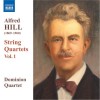Biography
Alfred Francis Hill CMG OBE (16 December 1869 – 30 October 1960) was an Australian/New Zealand composer, conductor and teacher.
Alfred Hill was born in Melbourne in 1869. His year of birth is shown in many sources as 1870, but this has now been disproven.[1] He spent most of his early life in New Zealand. He studied at the Leipzig Conservatory between 1887 and 1891 under Gustav Schreck, Hans Sitt and Oscar Paul. Later he played second violin with the Gewandhaus Orchestra, under guest conductors including Brahms, Grieg, Tchaikovsky, Bruch, and Reinecke. While there, some of his compositions were played with fellow students, and several were published in Germany. These included the Scotch Sonata for violin and piano.[2]
Hill returned to New Zealand, where was appointed director of the Wellington Orchestral Society.[2] He also worked as a violin teacher, recitalist, chamber musician, and choral conductor. He was active in the push for a New Zealand Conservatorium of Music, and for the foundation of an institute of Māori studies at Rotorua. During this period he completed his first string quartet, on Māori themes, which later would achieve some familiarity in the United States through regular programming by the Zoellner Quartet in the period surrounding World War I.[3]
In 1897 Hill returned to Australia, where he taught for a number of years. He married his first wife, Sarah Brownhill Booth, a New Zealander, on 6 October 1897 in Paddington, New South Wales.[4] They were to have three children, who were given the Wagnerian names Isolde, Tristan and Elsa.[4] In 1921 he divorced his wife, and on 1 October of that year married his former student Mirrie Solomon, also a composer.[4]
On 1 January 1901 he conducted a choir of 10,000 voices and ten massed brass bands as part of the celebrations of the Federation of Australia in Sydney. After several years regularly travelling between Australia and New Zealand, Hill settled in Sydney in 1911, becoming the principal of the Austral Orchestral College, and the 2nd violin player of the Austral String Quartet. In 1913 Hill founded the Australian Opera League with Fritz Hart, as part of an attempt to create an Australian operatic tradition. Hill was also a founder of the Sydney Repertory Theatre Society, and a foundation council member (later president) of the Musical Association of New South Wales.
Hill was also active as an organizer of music in Australia. In 1915–16 he co-founded the NSW State Conservatorium of Music and became its first Professor of Theory and Composition, and later deputy conductor to Henri Verbrugghen. When the Australian Broadcasting Commission was formed in 1932, Hill was member of the ABC's Music Advisory Committee.[2] In 1947 he became president of the Composers' Society of Australia.







